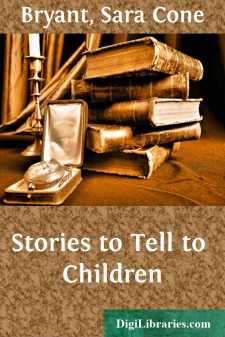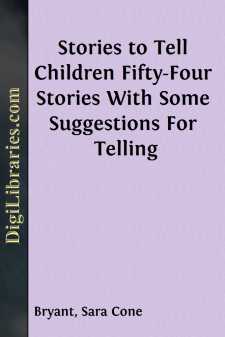Categories
- Antiques & Collectibles 13
- Architecture 36
- Art 48
- Bibles 22
- Biography & Autobiography 813
- Body, Mind & Spirit 142
- Business & Economics 28
- Children's Books 17
- Children's Fiction 14
- Computers 4
- Cooking 94
- Crafts & Hobbies 4
- Drama 346
- Education 46
- Family & Relationships 57
- Fiction 11829
- Games 19
- Gardening 17
- Health & Fitness 34
- History 1377
- House & Home 1
- Humor 147
- Juvenile Fiction 1873
- Juvenile Nonfiction 202
- Language Arts & Disciplines 88
- Law 16
- Literary Collections 686
- Literary Criticism 179
- Mathematics 13
- Medical 41
- Music 40
- Nature 179
- Non-Classifiable 1768
- Performing Arts 7
- Periodicals 1453
- Philosophy 64
- Photography 2
- Poetry 896
- Political Science 203
- Psychology 42
- Reference 154
- Religion 513
- Science 126
- Self-Help 84
- Social Science 81
- Sports & Recreation 34
- Study Aids 3
- Technology & Engineering 59
- Transportation 23
- Travel 463
- True Crime 29
Stories to Tell to Children
by: Sara Cone Bryant
Categories:
Description:
Excerpt
SOME SUGGESTIONS FOR THE STORY-TELLER
Concerning the fundamental points of method in telling a story, I have little to add to the principles which I have already stated as necessary, in my opinion, in the book of which this is, in a way, the continuation. But in the two years which have passed since that book was written, I have had the happiness of working on stories and the telling of them, among teachers and students all over this country, and in that experience certain secondary points of method have come to seem more important, or at least more in need of emphasis, than they did before. As so often happens, I had assumed that "those things are taken for granted;" whereas, to the beginner or the teacher not naturally a story-teller, the secondary or implied technique is often of greater difficulty than the mastery of underlying principles. The few suggestions which follow are of this practical, obvious kind.
Take your story seriously. No matter how riotously absurd it is, or how full of inane repetition, remember, if it is good enough to tell, it is a real story, and must be treated with respect. If you cannot feel so toward it, do not tell it. Have faith in the story, and in the attitude of the children toward it and you. If you fail in this, the immediate result will be a touch of shame-facedness, affecting your manner unfavorably, and, probably, influencing your accuracy and imaginative vividness.
Perhaps I can make the point clearer by telling you about one of the girls in a class which was studying stories last winter; I feel sure if she or any of her fellow students recognizes the incident, she will not resent being made to serve the good cause, even in the unattractive guise of a warning example.
A few members of the class had prepared the story of "The Fisherman and his Wife." The first girl called on was evidently inclined to feel that it was rather a foolish story. She tried to tell it well, but there were parts of it which produced in her the touch of shamefacedness to which I have referred.
When she came to the rhyme,—
"O man of the sea, come, listen to me,
For Alice, my wife, the plague of my life,
Has sent me to beg a boon of thee,"
she said it rather rapidly. At the first repetition she said it still more rapidly; the next time she came to the jingle she said it so fast and so low that it was unintelligible; and the next recurrence was too much for her. With a blush and a hesitating smile she said, "And he said that same thing, you know!" Of course everybody laughed, and of course the thread of interest and illusion was hopelessly broken for everybody.
Now, any one who chanced to hear Miss Shedlock tell that same story will remember that the absurd rhyme gave great opportunity for expression, in its very repetition; each time that the fisherman came to the water's edge his chagrin and unwillingness was greater, and his summons to the magic fish mirrored his feeling. The jingle IS foolish; that is a part of the charm. But if the person who tells it FEELS foolish, there is no charm at all!...




